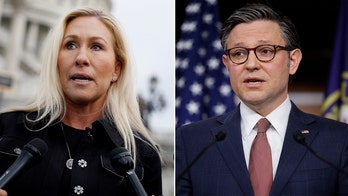A handful of Senate centrists are still not ready to support a slimmed-down $120 billion package of tax credit extensions, jobless benefits, and aid to cash-strapped states for Medicaid, though Democratic leaders trimmed about $20 billion from the bill's price tag and kept about $30 billion from hitting the deficit. A senior Senate Democratic leadership aide conceded to Fox that about three or four members of the caucus "are still at 'no'."
Sen. Ben Nelson, D-NE, who joined 11 of his Democratic colleagues Wednesday to defeat the original bill, said he is one of them. He told reporters Thursday that nothing has changed. The bill "is still not paid for," Nelson told reporters, so he is not prepared to change his vote.
Aaron Saunders, a spokesman for Sen. Mary Landrieu, D-LA, tells Fox his boss is "a definite 'no'," as well, particularly because of the increased tax on the oil and gas industry. The tax goes from 8 cents, where it is now, to 49 cents per barrel, raising $18.3 billion to replenish the Oil Liability Trust Fund. Republicans have accused Democrats of double-counting this revenue, saying that Dems cannot count a reduction in the deficit while also counting a replenishment of the fund.
On the other hand, Sen. Evan Bayh, D-IN, among the 'no' votes Wednesday, has signaled he intends to support the new measure, according to a senior aide on the Finance Committee. Bayh sought and won a $91 million alteration in tax breaks for Midwestern flood victims in low-income housing.
It is unclear if any moderate Republicans, whose votes have been hotly pursued, had changed their minds about the bill. Sen. Finance Committee Chairman Max Baucus, D-MT, primary author of the package, included a costly item in the bill aimed at getting the vote of one of them, Sen. Olympia Snowe, R-ME. Baucus scaled back a tax on certain individuals operating a business as an S corporation.
The Democratic leadership aide was not able to say if the bill was being trimmed back or more offsets were being sought, but one member of Senate GOP leadership suggested there was talk of scaling back the $24 billion in Medicaid funding for the states, an amount sought by governors on both sides of the political spectrum. The Democratic aide said he had not heard of such a cut; Senate Majority Leader Harry Reid, D-NV, has fought hard to keep that funding intact.
The aide said the leader could hold a test vote Friday, trying to shut off debate, knowing he would lose, in a move to pressure recalcitrant members to support the bill.
Democrats already scaled back a patch that keeps Medicare doctors from being seeing with a 21% cut in their federal reimbursement. Instead of 19 months for the fix, the new bill would cover only six, getting Democrats past the midterm elections, at a savings of about $16 billion.
Republicans in the chamber, led by Sen. John Thune, R-SD, sought approval on Thursday of an alternative package that would have extended jobless benefits and tax credits for businesses and individuals, while decreasing the deficit by $55 billion. On a vote of 41-57, the Thune amendment failed.
Frustrations boiled up on the Senate floor as the chamber closed in on two weeks of debate on the same bill and Medicare doctors moved dangerously close to incurring a 21% reduction in their federal reimbursement and unemployment benefit checks hung in the balance. Two normally mild-mannered, genial senators, one Democrat, one Republican raised their voices in disagreement on the floor (a rare event, in and of itself).
"We will never get out of this deficit ditch until people get back to work, until they are back and contributing and being a part of this economy," Sen. Debbie Stabenow, D-MI, lectured her colleagues in an exasperated tone, as she advocated for an extension of unemployment benefits. "Despite the former Vice President's claim that deficits didn't matter, now they matter. I believe deficits matter...With all due respect, we just have a very different view of the world, and coming from the great state of Michigan, people would say it's about time somebody's focusing on them."
Sen. George LeMieux, R-FL, quickly retorted, referring to the amount Democrats would increase the deficit with their new bill, "I don't disagree with you about spending the money. I would like to know...Would my friend not agree with me that we can find $50 billion somewhere in this government?"
Stabenow shot back, "Would you agree then, that we should, rather than decreasing the estate tax for less than 1/2% of the public, that any dollars there should go back to the people?"
"Respectfully, the estate tax issue is a difference issue," LeMieux started, as Stabenow tried to interrupt. LeMieux, a former staffer appointed to a vacant seat a year ago, reverted to calling his colleague, "ma'am." LeMieux stumbled, and then reminded Stabenow, "Right now there's no estate tax this year. We have a difference...on tax issues...My question is, is there not $55 billion somewhere?...Could we not find an offset to not have it put on our children and grandchildren?"
It's going to be a rough four months ahead before the elections.




